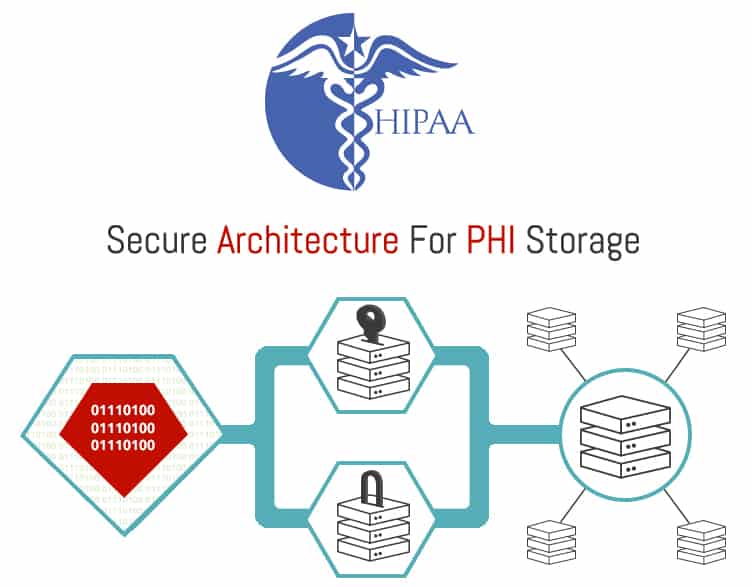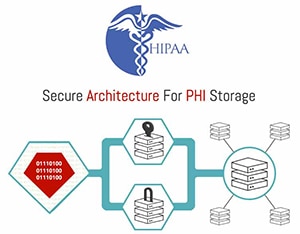Is HIPAA Compliance For a Doctor or Dental Website Required?
Question: I Operate a Medical Clinic, Do I Need to Have a HIPAA Compliant Website?
Short answer is YES. Yes, a doctor’s website must be HIPAA compliant if it collects, stores, or transmits any Protected Health Information (PHI). If a website only provides general information and services, it is not required to be HIPAA compliant. However, any online forms, appointment scheduling, or other features that handle patient data make compliance mandatory. If you have a healthcare business, medical practice or a clinic with a medical website, and potential or existing patients communicate with you using the website you are likely receiving Protected Health Information (PHI). If patients use your website to call you, book appointments, ask questions, send Emails, or send forms, it can be subject to HIPAA laws. PatientGain.com highly recommends that all websites should an SSL certificate, and servers should conform to HIPAA guidelines. PatientGain uses industry standard servers hosted by Amazon Web Services, which complies with HIPAA and HITECH laws. In addition, PatientGain provides regular training about security and protecting patient information to its staff. This training is required for all staff. In addition, staff are back-ground checked. PatientGain also reviews security logs, application users have restricted access based on roles. We also do not allow “generic” logins, like “frontdesk@…….” . All of these measures are there to protect customers.
Medical Website HIPAA Compliance Requirements


Question: Is PatientGain HIPAA Compliant?
Yes, PatientGain is HIPAA compliant:
- Patient database: PatientGain’s Customer Relationship Manager (CRM) stores patient information securely and in accordance with HIPAA guidelines.
- Software: PatientGain’s software has integrated security protocols and uses best data handling practices to maintain HIPAA compliance.
- Apps: PatientGain’s apps for healthcare clinics save protected health information (PHI) in secure servers that meet HIPAA guidelines. Role based access is implemented for all users within the company, and all customer accounts are subject to role-based access.
- Business Associate Agreement (BAA): PatientGain provides standard BAA for its customers. Customers who do not comply with HIPAA guidelines will not have any BAA protection.
- All PatientGain staff go through regular security and HIPAA training. All staff members are back ground checked.
- Security logs are checked every day. One staff member reviews the logs, and creates a record of the logs. Another staff member (human, not a bot) reviews and verifies the log files.
Key Considerations for HIPAA Compliant Marketing
- Business Associate Agreements (BAA): Marketing agencies working with healthcare providers are considered business associates and need to sign a BAA with their clients to ensure they are also HIPAA compliant. PatientGain complies with this HIPAA provision.
- Data Encryption: All electronic Protected Health Information (ePHI) must be encrypted when created, stored, transmitted, or received. PatientGain complies with this HIPAA provision.
- HIPAA Compliant Websites Require SSL/TLS Certificate . ePHI without an SSL/TLS certificate (and thus runs on unencrypted HTTP) would almost certainly be found to be in violation of HIPAA’s security standards. The HIPAA Security Rule requires covered entities and business associates to protect the confidentiality, integrity, and availability of ePHI. While HIPAA does not explicitly mention “SSL certificates,” it mandates the implementation of mechanisms to encrypt ePHI when it is being transmitted over open networks (an “addressable” implementation specification).
- Access Controls: Access to ePHI should be limited based on job roles and responsibilities. PatientGain complies with this HIPAA provision.
- Audit Logs: Systems should track who accesses data and when, to help identify potential breaches. PatientGain complies with this HIPAA provision.
- Secure File Transfer: Marketing materials and data should be transferred through secure, encrypted platforms. PatientGain complies with this HIPAA provision.
- Training: All staff handling PHI need to be trained on HIPAA regulations and policies. PatientGain complies with this HIPAA provision.
If you have been audited for a HIPAA violation, you may be asked to provide a Business Associate Agreements (BAA) from all vendors, including your website provider, who may have transported, viewed, stored or handled PHI. As a healthcare business owner or manager it is your responsibility to address BAA requirements from all providers of services to your medical practice.
As a medical provider, you must following information, ALL the time. There are 18 things or identifiers that make health information PHI . These are:
- Names
- Dates, except year
- Telephone numbers
- Geographic data
- FAX numbers
- Social Security numbers
- Email addresses
- Medical record numbers
- Account numbers
- Health plan beneficiary numbers
- Certificate/license numbers
- Vehicle identifiers and serial numbers including license plates
- Web URLs
- Device identifiers and serial numbers
- Internet protocol addresses
- Full face photos and comparable images
- Biometric identifiers (i.e. retinal scan, fingerprints)
- Any unique identifying number or code – For example if a patient has a pacemaker, there is a unique service number for each pacemaker. This would be considered a PHI
One or more of these identifiers turns health information into PHI and PHI HIPAA Privacy Rule restrictions will then apply, which limit uses and disclosures of the information. HIPAA covered entities and their business associates will also need to ensure appropriate technical, physical, and administrative safeguards are implemented to ensure the confidentiality, integrity, and availability of PHI, as stipulated in the HIPAA Security Rule.
Medical Marketing HIPAA Compliance
PatientGain.com provides BAA for its customers upon request. In order to understand what is covered, let’s review four major areas of HIPAA and some definitions.
What is PHI: Protected Health Information (PHI) refers to information about a patient you are about to treat (prospect patient), or an existing patient’s personal information, that must be guarded and treated as determined by HIPAA laws.
What is a Covered Entity: In HIPAA’s legal language, the Covered Entity is the healthcare business, medical practice providing services to patients. References to “Covered Entity” mean your practice, your clinic, or your medical facility.
What is a Business Associate: A business associate is a service provider or a vendor that provides services, technology, websites, electronic storage, software databases, etc. to a Covered Entity. This means your website provider is a Business Associate.
What is a Business Associate Agreement (BAA): A BAA is a legal document provided to your clinic, that states in detail that the Business Associate has taken necessary steps, in accordance with HIPAA regulations, to provide security and other measures to protect PHI.
It is important to note that Covered Entities and their Business Associates need to protect the privacy and security of protected health information (PHI). But, it gets more complicated when you start to put together a to-do list. Covered entities are required to apply the appropriate administrative, technical, and physical safeguards to protect the privacy of protected health information. This applies to all forms of protected health information. As such, covered entities are not permitted to abandon protected health information or dispose such information that it will be accessible to the public or unauthorized individuals. Covered entities are required to train their workforce on the proper disposal of protected health information. It is important to note that under federal standards, the “workforce” includes volunteers. Covered entities should also determine what steps are reasonable to dispose protected health information while comply with the HIPAA Privacy and Security Rules.
There are four key rules:
1. HIPAA Privacy Rule
2. HIPAA Security Rule
3. HIPAA Enforcement Rule
4. HIPAA Breach Notification Rule
Each Covered Entity needs to follow all four rules. HIPAA Privacy Rule and the HIPAA Security Rule are very detailed and require a lot of effort. To stay in accordance with the Breach Notification Rule, you need to provide notification following a breach of unsecured Protected Health Information.
This article is not a definitive list of what is required for HIPAA compliance, you should assign a Privacy Officer to review each rule in its entirety. This article is intended to point you in the right direction. PatientGain.com will provide BAA for your clinic, if requested. PatientGain.com apps for healthcare clinics save the PHI information in a secure server that meets HIPAA guidelines. Contact us for more information.
HIPAA violation vs incidental disclosure
A HIPAA violation involves an unauthorized disclosure or misuse of protected health information (PHI), whether accidental or intentional, if the entity failed to implement reasonable safeguards.
An incidental disclosure is a specific type of unavoidable, limited, and unintentional disclosure of PHI that occurs despite the implementation of all reasonable safeguards and does not pose a significant risk of harm. Therefore, a violation occurs if proper safeguards are not in place, or if the disclosure was not limited and unavoidable, while an incidental disclosure is an acceptable, albeit undesirable, occurrence within the scope of the HIPAA Privacy Rule.
HIPAA Violation
- Definition:A breach of the HIPAA Privacy, Security, or Breach Notification Rules when PHI is used or shared in a way not permitted by the rules.
- Intent/Negligence:Can involve deliberate actions, gross negligence, or a failure to follow required safeguards.
- Safeguards:Occurs when reasonable safeguards were not implemented, or when the organization failed to perform necessary risk assessments.
- Examples:
- Employee snooping through patient files.
- Improper disposal of electronic devices with PHI.
- Sharing patient information through insecure methods.
- Failure to perform a risk analysis to identify vulnerabilities.
Incidental Disclosure
- Definition:A secondary, limited, and unintentional disclosure of PHI that cannot reasonably be prevented and occurs as a byproduct of a permitted activity, despite the presence of reasonable safeguards.
- Intent/Negligence:Always unintentional, not due to negligence or a failure to follow rules.
- Safeguards:Occurs only when “reasonable safeguards” have been implemented to protect PHI.
- Examples:
- A visitor overhearing a doctor’s conversation with a patient in a waiting room.
- A patient seeing another’s name on a sign-in sheet.
- A glimpse of another patient’s X-ray on a board in a public area.
Key Distinction
- HIPAA violations are always reportable events and can incur penalties.
- Incidental disclosures are not violations if they were unavoidable despite the use of reasonable safeguards, as defined by the Office for Civil Rights (OCR).
- Crucially, all incidental disclosures are unintentional, but not all unintentional disclosures are incidental disclosures
